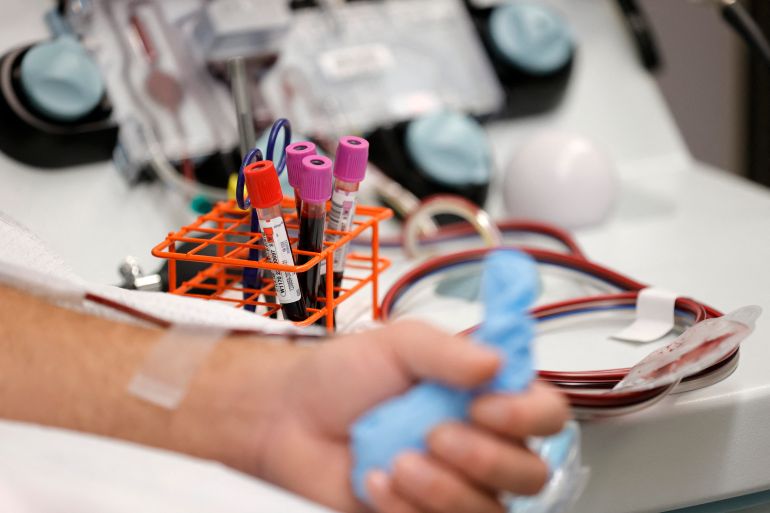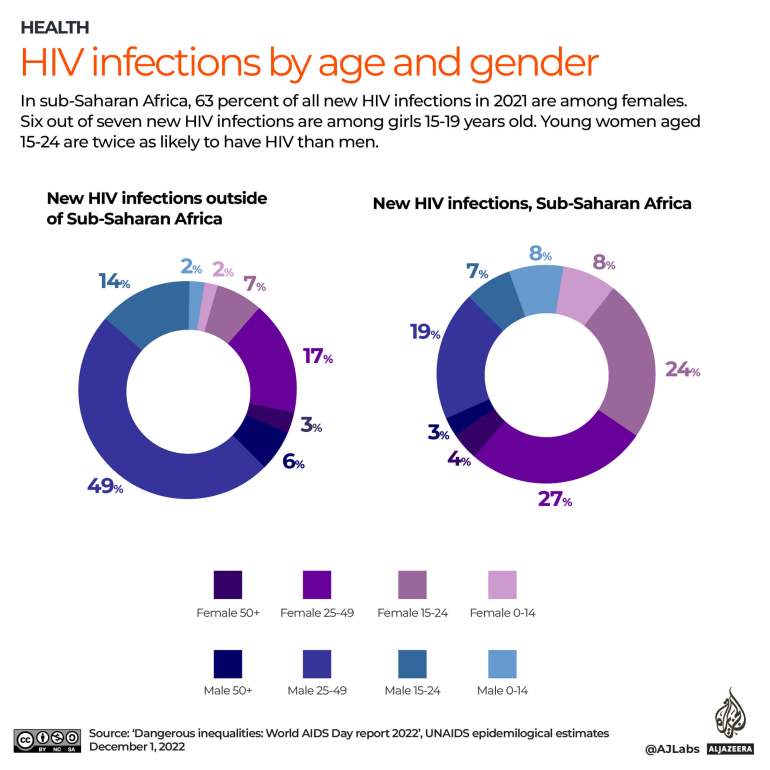US relaxes restrictions for gay, bisexual men to donate blood
Updated guidelines will replace three-month abstinence rule that LGBTQ advocates had long decried as discriminatory.

The United States has announced that it will expand the ability of gay and bisexual men to donate blood, moving to a single set of criteria for all prospective donors.
On Thursday, the US Food and Drug Administration (FDA) said it updated federal guidelines for blood donations to do away with a requirement that men who have sex with men abstain from sex for three months prior to giving blood.
Keep reading
list of 3 itemsIn Uganda, injectable HIV treatment offers hope to patients
A letter to … the HIV that is in my bloodstream
Instead, all potential donors — regardless of sexual orientation, sex or gender — will be screened with a new questionnaire that evaluates their individual risks for HIV based on sexual behaviour, recent partners and other factors.
“The implementation of these recommendations will represent a significant milestone for the agency and the LGBTQI+ community,” Dr Peter Marks, director of the FDA’s Center for Biological Therapies, said in a statement.
The change came after decades of criticism that the government unfairly discriminated against gay men wishing to donate blood, forcing them to take additional measures before donating even though AIDS can impact people from different backgrounds.
The new guidelines, which were crafted in January and can now be used by blood banks, focus on individual behaviour instead of sexual orientation.
They also state that potential donors who report having had anal sex with a new partner within the last three months will be asked to wait to donate until a later date.
The FDA said the new guidelines are in line with the latest scientific evidence and mirror standards in countries such as the United Kingdom and Canada.
Gay rights groups and medical organisations such as the American Medical Association have opposed blanket rules based on sexual orientation, with the AMA noting that advancements in blood testing also make them unnecessary.
Anyone who has ever tested positive for HIV will remain barred from donating, and people taking HIV prevention medication such as PrEP will also be barred for up to three months after their last dose.
The LGBTQ rights group Human Rights Campaign welcomed the FDA announcement, saying that more steps should be taken to ensure that “people taking PrEP can donate as well”. The FDA has stated that PrEP can make it more difficult to detect the virus in screening tests.
Policies around blood donation have long been a topic of emotional weight in the LGBTQ community, which suffered abuse, neglect, and discrimination from the government and civil society organisations during the AIDS crisis.

While the first case of AIDS was detected in the US in 1981, Republican President Ronald Reagan did not mention the disease publicly until near the end of 1985, partly due to concerns that showing empathy for victims of a disease many associated with homosexuality could harm his support from groups on the religious right.
By the time Reagan did so, more than 21,000 people had died of AIDS across the country, according to the San Francisco AIDS Foundation.
Black and Latino gay men make up “a disproportionate number of HIV diagnoses” in the US, according to the US Centers for Disease Control and Prevention (CDC).
However, people from all backgrounds can contract HIV, and the CDC reported that heterosexual contact accounted for about 22 percent of transmissions in 2020.
In 2015, the FDA dropped a previous lifetime ban on blood donations from men who have sex with men and replaced it with a one-year abstinence requirement, which was revised down to three months in 2020.